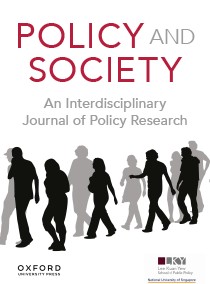满足期望?政策创新实验室对可持续发展目标的回应
IF 5.7
1区 社会学
Q1 POLITICAL SCIENCE
引用次数: 0
摘要
可持续发展目标(SDGs)由联合国提出,旨在促进包容性可持续发展。响应可持续发展目标被认为是解决紧迫发展问题的关键。目前的文献主要关注各种公共组织对可持续发展目标的响应,而对政策创新实验室(PILs)响应可持续发展目标的情况研究不足。政策创新实验室旨在解决长期存在和新出现的社会和环境问题,与可持续发展目标是一致的。另一方面,政策创新实验室寻求创新方法,通过实验方法与公民合作产生政策解决方案,因此更致力于当地公众而非国际组织。本文研究了 PIL 在政策制定过程中对可持续发展目标做出回应的程度和方式,包括隐性和显性回应。数据来源于作者开发的数据库,该数据库识别了 211 个欧洲私人法律组织。对 PIL 网站进行的主题编码显示,62.1% 的 PIL 暗中促进了至少一项可持续发展目标。此外,可持续城市和社区(SDG11)以及良好的健康和福祉(SDG3)分别是隐性响应率最高的两个可持续发展目标。我们通过对 31 家 PIL 的高级员工进行半结构式访谈,运用基础理论分析来了解他们对可持续发展目标的明确看法。这种归纳法揭示了可持续发展目标的三个维度:响应程度、不同做法以及指导 PIL 是否遵守可持续发展目标的考虑因素。通过更好地了解 PIL 对可持续发展目标的响应,可以更细致地描绘 PIL 作为旨在制定与国际框架相一致的创新政策解决方案的组织。本文章由计算机程序翻译,如有差异,请以英文原文为准。
Meeting expectations? Response of policy innovation labs to sustainable development goals
Introduced by the United Nations, Sustainable Development Goals (SDGs) aim at facilitating inclusive sustainable development. Responsiveness to SDGs is considered a key to addressing pressing development problems. The current literature focuses on the responsiveness of varied public organizations to SDGs, whereas SDGs’ responsiveness of policy innovation labs (PILs) is understudied. Aiming to address both persistent and emerging social and environmental problems, PILs are aligned with SDGs. On the other hand, PILs seek innovative ways to generate policy solutions in collaboration with citizens through experimental methods and thus are more committed to the local public rather than international organizations. This paper investigates to what extent and in what way PILs respond to SDGs during policy formulation processes, both implicitly and explicitly. Data draws on a database the authors developed, identifying 211 European PILs. Thematic coding of PILs’ websites reveals that 62.1% of the PILs implicitly promote at least one SDG. Additionally, sustainable cities and communities (SDG11) and good health and well-being (SDG3) are the two SDGs with the highest implicit-response rates, respectively. We apply grounded theory analysis from semi-structured interviews with senior PIL employees of 31 PILs to gauge their explicit views of SDGs. This inductive approach reveals three dimensions to SDGs: levels of responsiveness, different practices, and considerations that guide PILs on whether to comply with SDGs. A better understanding of PILs’ response to SDGs provides a more nuanced portrayal of PILs as organizations aiming to craft innovative policy solutions that align with international frameworks.
求助全文
通过发布文献求助,成功后即可免费获取论文全文。
去求助
来源期刊

Policy and Society
Multiple-
CiteScore
18.00
自引率
6.50%
发文量
43
审稿时长
30 weeks
期刊介绍:
Policy and Society is a prominent international open-access journal publishing peer-reviewed research on critical issues in policy theory and practice across local, national, and international levels. The journal seeks to comprehend the origin, functioning, and implications of policies within broader political, social, and economic contexts. It publishes themed issues regularly and, starting in 2023, will also feature non-themed individual submissions.
 求助内容:
求助内容: 应助结果提醒方式:
应助结果提醒方式:


